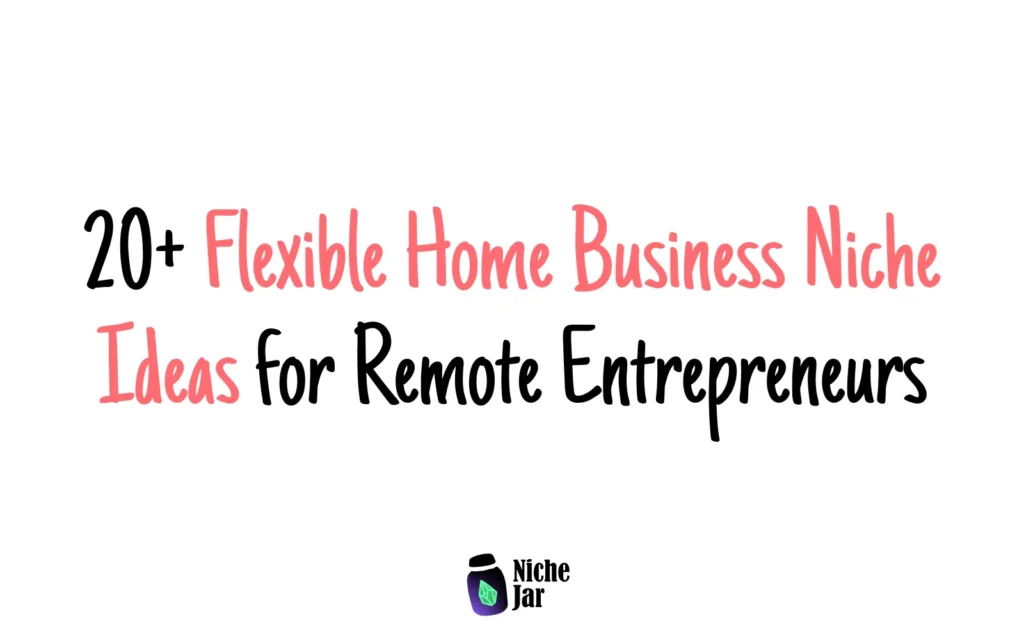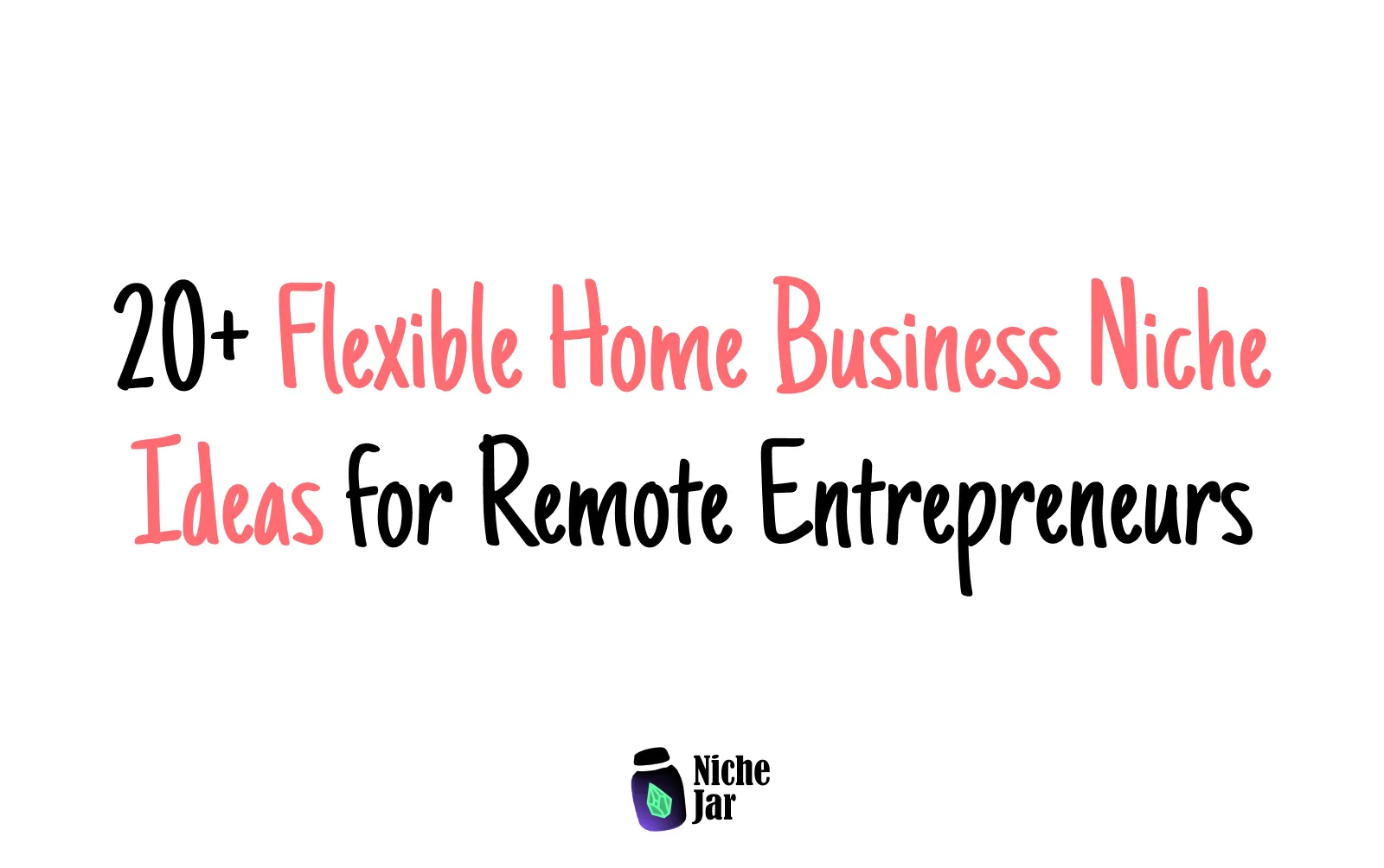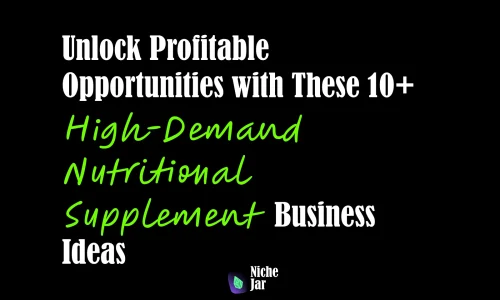- Senia
- 0 Comments
- 983 Views
Working from home has become more than a trend—it’s a way to balance life, family, and income. From what I’ve seen, many people dream of flexible home businesses but feel unsure where to start. This guide on flexible home business niche ideas for remote entrepreneurs offers practical ideas, step-by-step strategies, and real-world insights to help you take the first step.
Remote work and home-based businesses have opened up a world of possibilities for anyone willing to take initiative. From freelancers and parents to retirees and students, the ability to earn income from home while controlling your schedule has never been more appealing.
I believe this could help because it allows everyday people to explore passions, leverage skills, and create income streams without a traditional office. The flexibility of working from home also supports personal well-being, travel, or even pursuing multiple income streams simultaneously.
Choosing a profitable niche is crucial. Many people try to chase the “next big thing” without focusing on what they can consistently deliver. From my experience, success often comes from identifying a niche that combines demand, your skills, and long-term sustainability. For example, offering virtual assistant services might seem simple, but it solves a tangible problem for small business owners who are overwhelmed with tasks.
In this post, I’ll walk you through 20+ flexible home business ideas for remote entrepreneurs. Each idea will include:
- How the business works and why it’s profitable
- Step-by-step setup guidance
- Potential challenges and practical solutions
- Estimated startup costs
- Monetization strategies
- Realistic case studies

1. Freelance Writing and Editing
Why it works: Businesses and bloggers need content constantly. Well-written material helps websites rank and attract customers.
How to start:
- Identify niches you know well (tech, lifestyle, finance).
- Create a portfolio (can be free samples).
- Join platforms like Upwork, Fiverr, or ProBlogger.
Challenges & solutions: It can be competitive. Specializing in a niche and offering quick turnaround builds credibility.
Startup costs: $0–$200 (laptop, internet, basic editing software).
Monetization: Per-project rates, retainer contracts, subscription services.
Example: A stay-at-home parent started writing parenting blogs and now earns $1,000/month consistently.

2. Virtual Assistance Services
Why it works: Small business owners often lack time for routine tasks. Virtual assistants (VAs) help with emails, scheduling, and admin work.
How to start:
- Define services (email management, social media scheduling, customer support).
- Create a simple website or Fiverr/Upwork profile.
- Offer initial trial clients at a lower rate to gain experience.
Challenges & solutions: Managing multiple clients can be overwhelming. Use task management tools like Trello or Asana.
Startup costs: $50–$100 (website and tools).
Monetization: Hourly rates ($15–$50/hr), package deals.
Example: A freelancer provided VA services to local entrepreneurs and scaled to managing five clients for $2,000/month.
3. Online Tutoring or Teaching
Why it works: Remote learning has created huge demand for tutors in languages, math, coding, or test prep.
How to start:
- Identify your expertise.
- Join platforms like VIPKid, Wyzant, or Teachable.
- Set up a simple home studio (quiet space + webcam).
Challenges & solutions: Students may be inconsistent. Scheduling multiple clients and offering package sessions helps maintain steady income.
Startup costs: $50–$150 (headset, webcam).
Monetization: Hourly tutoring fees, course packages.
Example: A former teacher offered SAT prep online and earns $2,500/month tutoring 15 students.

4. Social Media Management
Why it works: Brands need consistent social media presence but don’t have time or expertise.
How to start:
- Learn tools like Buffer, Canva, and Later.
- Offer packages (e.g., 12 posts/month + engagement).
- Approach small businesses or influencers.
Challenges & solutions: Clients expect rapid growth. Educate them on realistic timelines and analytics tracking.
Startup costs: $50–$100 (tools).
Monetization: Retainers ($300–$1,000/month).
Example: A college student manages social media for three local shops, earning $1,500/month.
5. E-commerce Store (Print-on-Demand or Handmade Products)
Why it works: You can sell without holding inventory. Print-on-demand or handmade goods meet growing online shopping demand.
How to start:
- Choose niche products (T-shirts, mugs, digital prints).
- Use platforms like Shopify, Etsy, or Redbubble.
- Promote on Instagram, Pinterest, or TikTok.
Challenges & solutions: Marketing can be slow. Leverage content marketing and organic social media posts.
Startup costs: $50–$500 (design software, platform fees).
Monetization: Product sales, bundle packages, seasonal promotions.
Example: An artist launched a POD shop on Etsy, earning $600/month within 3 months.
6. Affiliate Marketing Websites
Why it works: Reviews, product comparisons, and guides can generate passive income via affiliate links.
How to start:
- Choose a niche you understand (tech, health, hobbies).
- Build a website with WordPress.
- Join affiliate programs like Amazon Associates or niche-specific partners.
Challenges & solutions: Initial traffic is slow. Focus on long-tail SEO and content quality.
Startup costs: $100–$200 (domain, hosting).
Monetization: Affiliate commissions, sponsored posts, digital product upsells.
Example: A travel blogger created a “best travel gear” website and earns $400/month in affiliate commissions.

7. Blogging for Passive Income
Why it works: Blogs remain effective for SEO traffic and passive income through ads or affiliate links.
How to start:
- Pick a niche (finance, parenting, productivity).
- Publish 1–2 posts/week.
- Learn basic SEO to rank content.
Challenges & solutions: Growth takes patience. Track analytics to see which posts perform best.
Startup costs: $100–$200.
Monetization: Ads, sponsored posts, affiliate marketing, digital product sales.
Example: A hobbyist blogger covering DIY crafts earns $300/month from ads and affiliate links.
8. Digital Marketing Consulting
Why it works: Small businesses often need guidance on SEO, social media, and paid ads.
How to start:
- Build knowledge through free courses or past experience.
- Offer audits or consultations online.
- Market via LinkedIn or your own network.
Challenges & solutions: Convincing clients of value can be tough. Use case studies or free initial consultations.
Startup costs: $50–$100 (website and software).
Monetization: Hourly consulting fees ($50–$150/hr), packages.
Example: A marketing student consulted for two local stores, generating $1,200/month in income.
9. Graphic Design Services
Why it works: Businesses, bloggers, and social media managers need visuals regularly.
How to start:
- Learn Canva, Adobe Illustrator, or Photoshop.
- Create a portfolio.
- Offer services on Fiverr, Upwork, or directly to small brands.
Challenges & solutions: Competition is high. Niche down to business cards, social media graphics, or digital ads.
Startup costs: $0–$300 (software and laptop).
Monetization: Per-project or retainer pricing.
Example: A student offered Canva social media packages and earns $800/month.

10. Web Development or Tech Support
Why it works: Small businesses need websites, apps, and tech troubleshooting but can’t hire full-time IT staff.
How to start:
- Learn basic coding or platforms like WordPress, Shopify, Wix.
- Offer website building or tech support packages.
- Reach out to local businesses online.
Challenges & solutions: Keeping skills updated is essential. Take short courses and stay active in online communities.
Startup costs: $50–$500 (software, hosting, training).
Monetization: Project-based fees, monthly support packages.
Example: A freelancer built Shopify stores for local shops, earning $1,500/month.
11. Online Course Creation
Why it works: People pay for structured learning, especially for skills that save time or boost careers.
How to start:
- Identify your expertise (coding, cooking, design, productivity).
- Outline course modules and lessons.
- Use platforms like Teachable, Thinkific, or Udemy.
Challenges & solutions: Creating a full course can feel overwhelming. Start with a mini-course to test demand and gather feedback.
Startup costs: $50–$300 (software, microphone, camera).
Monetization: One-time course sales, subscription access, or bundled offerings.
Example: A home cook launched a baking course for beginners and earned $500/month within the first three months.
12. Podcasting or YouTube Channel
Why it works: Audio/video content is increasingly popular, and advertisers or sponsors seek creators in specific niches.
How to start:
- Pick a topic you are passionate about.
- Record with basic equipment (mic, webcam, or phone).
- Publish consistently and share on social platforms.
Challenges & solutions: Growing an audience takes time. Collaborate with other creators or repurpose content to multiple platforms.
Startup costs: $100–$400 (mic, basic editing software).
Monetization: Sponsorships, ads, merchandise, Patreon support.
Example: A travel enthusiast started a weekly vlog on YouTube, gradually earning $300/month from ads.

13. Remote Bookkeeping or Accounting
Why it works: Small businesses need accurate financial records but don’t always hire full-time staff.
How to start:
- Get familiar with QuickBooks, Xero, or other accounting software.
- Offer bookkeeping services to small businesses or freelancers.
- Use LinkedIn or local business directories to find clients.
Challenges & solutions: Accuracy is critical. Double-check entries and consider certification courses for credibility.
Startup costs: $100–$500 (software subscription, certification if desired).
Monetization: Hourly or monthly client fees ($30–$100/hr).
Example: A freelancer manages three local clients’ books, earning $1,200/month.
14. Transcription Services
Why it works: Businesses, podcasters, and educators need audio/video transcribed accurately.
How to start:
- Join platforms like Rev, TranscribeMe, or Upwork.
- Develop fast typing and listening skills.
- Offer niche transcription (medical, legal, tech) for higher rates.
Challenges & solutions: Can be tedious. Use foot pedals or software to speed up workflow.
Startup costs: $0–$200 (good headset, transcription software).
Monetization: Per-audio-minute or hourly rates ($15–$50/hr).
Example: A freelancer transcribed webinars for educators, earning $500/month part-time.
15. Voiceover Work
Why it works: Audiobooks, ads, and explainer videos need professional voices.
How to start:
- Purchase a decent microphone (~$100).
- Record sample clips.
- Join Fiverr, Voices.com, or reach out to small businesses.
Challenges & solutions: Standing out is tough. Focus on a niche voice style (e.g., friendly narration, tech explainer).
Startup costs: $100–$300.
Monetization: Project-based fees, long-term contracts.
Example: A freelancer recorded explainer videos for startups, earning $200/project.

16. Subscription Box or Curated Product Services
Why it works: Customers love curated experiences, from gourmet snacks to self-care kits.
How to start:
- Choose a niche (eco-friendly products, fitness, art supplies).
- Source products and create small packages.
- Market via Instagram, email, or website.
Challenges & solutions: Logistics and shipping can be tricky. Start locally or with small batches to test demand.
Startup costs: $200–$500.
Monetization: Monthly subscriptions ($20–$50/month).
Example: A creative entrepreneur launched a wellness box, reaching 50 subscribers within three months.
17. Resume Writing and Career Coaching
Why it works: Job seekers pay for professional resumes, cover letters, and career guidance.
How to start:
- Learn current hiring trends and ATS-friendly resume formats.
- Offer packages (resume + LinkedIn profile + interview prep).
- Market via LinkedIn, Fiverr, or personal website.
Challenges & solutions: Initial credibility is key. Offer a few free samples or testimonials to build trust.
Startup costs: $0–$100.
Monetization: Per-resume or coaching session ($50–$200).
Example: A career coach created resumes for remote job seekers, earning $600/month part-time.
18. Translation Services
Why it works: Global businesses need multilingual content.
How to start:
- Offer translation for documents, websites, or subtitles.
- Join platforms like Gengo, ProZ, or Fiverr.
- Focus on in-demand language pairs.
Challenges & solutions: Accuracy is crucial. Proofread or collaborate with a second translator.
Startup costs: Minimal ($0–$50).
Monetization: Per-word, per-project, or hourly rates ($0.05–$0.20/word).
Example: A bilingual freelancer translated blog content for international clients, earning $400/month.
19. Etsy or Creative Marketplace Selling
Why it works: Handmade, vintage, or craft items sell well online.
How to start:
- Identify niche products (jewelry, art, digital downloads).
- Open an Etsy shop or similar platform.
- Use social media for promotion.
Challenges & solutions: Competition is high. Unique designs or branding help stand out.
Startup costs: $50–$300 (materials, Etsy fees).
Monetization: Product sales, custom orders, seasonal promotions.
Example: A hobbyist sold digital planners on Etsy and earned $500/month.
20. Mobile App or Software Development
Why it works: Businesses and consumers need apps or simple software solutions.
How to start:
- Learn app development tools (Swift, Flutter, no-code platforms).
- Offer niche apps or custom solutions for small businesses.
- Market via online communities or freelance platforms.
Challenges & solutions: Coding skills take time. Start with no-code solutions for rapid prototypes.
Startup costs: $100–$500.
Monetization: App sales, in-app purchases, service contracts.
Example: A freelancer developed a local event app and earned $300/month from ad revenue.
21. Online Community Management
Why it works: Brands and creators need moderators and community managers for forums, social groups, and membership sites.
How to start:
- Offer moderation, engagement, and content curation.
- Approach small businesses, online course creators, or subscription groups.
- Use Slack, Discord, or Facebook Groups to manage communities.
Challenges & solutions: Managing toxic behavior can be tough. Establish clear guidelines and automation tools.
Startup costs: Minimal ($0–$50).
Monetization: Hourly or monthly retainers ($200–$800/month).
Example: A freelancer managed a wellness Facebook group, earning $400/month part-time.
22. AI-Assisted Content or Tool Services
Why it works: Many businesses want AI-generated content but lack know-how.
How to start:
- Create prompts, templates, or AI-driven content packages.
- Offer services for blogs, social media, or marketing materials.
- Teach clients how to use AI tools effectively.
Challenges & solutions: AI evolves quickly. Keep learning and provide value beyond automation (editing, strategy).
Startup costs: $0–$100 (software or subscriptions).
Monetization: Template sales, AI service packages, training sessions.
Example: A freelancer offered AI blog starter packs to small businesses, earning $300/month.
From my experience, flexible home businesses can suit almost anyone, whether you want a small side income or full-time remote work. The key is consistency, choosing a niche you enjoy, and learning as you grow. Remember, every journey starts small, and building trust and skills over time often leads to steady, sustainable income.
Consider exploring other guides on Nichejar.com to expand your knowledge, try multiple ideas, and find the right fit. Share your experiences, ask questions, or connect with fellow remote entrepreneurs—learning together makes the journey easier.
TLDR
In short: here are the highlights for remote entrepreneurs looking for flexible home businesses:
- Freelance writing & editing: Low startup cost, steady demand.
- Virtual assistance: Hourly work with repeat clients.
- Online tutoring: Share expertise online.
- Social media management: Help small businesses grow online.
- E-commerce (POD/handmade): Sell unique products from home.
- Affiliate marketing: Monetize blogs and niche websites.
- Blogging for passive income: Long-term growth through SEO.






